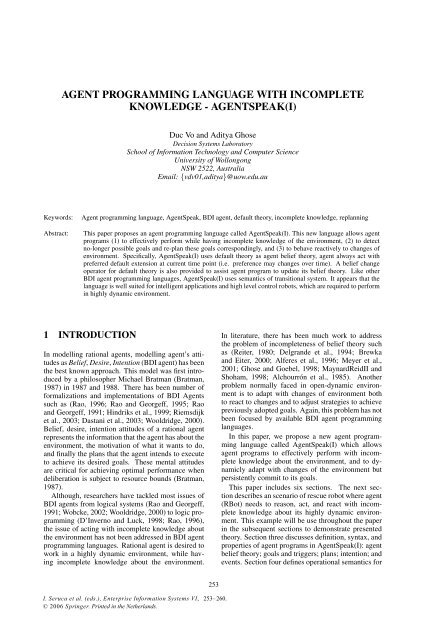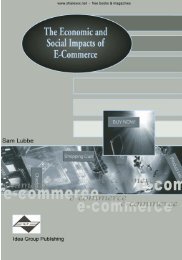Back Room Front Room 2
Back Room Front Room 2
Back Room Front Room 2
You also want an ePaper? Increase the reach of your titles
YUMPU automatically turns print PDFs into web optimized ePapers that Google loves.
AGENT PROGRAMMING LANGUAGE WITH INCOMPLETE<br />
KNOWLEDGE - AGENTSPEAK(I)<br />
Duc Vo and Aditya Ghose<br />
Decision Systems Laboratory<br />
School of Information Technology and Computer Science<br />
University of Wollongong<br />
NSW 2522, Australia<br />
Email: {vdv01,aditya}@uow.edu.au<br />
Keywords: Agent programming language, AgentSpeak, BDI agent, default theory, incomplete knowledge, replanning<br />
Abstract: This paper proposes an agent programming language called AgentSpeak(I). This new language allows agent<br />
programs (1) to effectively perform while having incomplete knowledge of the environment, (2) to detect<br />
no-longer possible goals and re-plan these goals correspondingly, and (3) to behave reactively to changes of<br />
environment. Specifically, AgentSpeak(I) uses default theory as agent belief theory, agent always act with<br />
preferred default extension at current time point (i.e. preference may changes over time). A belief change<br />
operator for default theory is also provided to assist agent program to update its belief theory. Like other<br />
BDI agent programming languages, AgentSpeak(I) uses semantics of transitional system. It appears that the<br />
language is well suited for intelligent applications and high level control robots, which are required to perform<br />
in highly dynamic environment.<br />
1 INTRODUCTION<br />
In modelling rational agents, modelling agent’s attitudes<br />
as Belief, Desire, Intention (BDI agent) has been<br />
the best known approach. This model was first introduced<br />
by a philosopher Michael Bratman (Bratman,<br />
1987) in 1987 and 1988. There has been number of<br />
formalizations and implementations of BDI Agents<br />
such as (Rao, 1996; Rao and Georgeff, 1995; Rao<br />
and Georgeff, 1991; Hindriks et al., 1999; Riemsdijk<br />
et al., 2003; Dastani et al., 2003; Wooldridge, 2000).<br />
Belief, desire, intention attitudes of a rational agent<br />
represents the information that the agent has about the<br />
environment, the motivation of what it wants to do,<br />
and finally the plans that the agent intends to execute<br />
to achieve its desired goals. These mental attitudes<br />
are critical for achieving optimal performance when<br />
deliberation is subject to resource bounds (Bratman,<br />
1987).<br />
Although, researchers have tackled most issues of<br />
BDI agents from logical systems (Rao and Georgeff,<br />
1991; Wobcke, 2002; Wooldridge, 2000) to logic programming<br />
(D’Inverno and Luck, 1998; Rao, 1996),<br />
the issue of acting with incomplete knowledge about<br />
the environment has not been addressed in BDI agent<br />
programming languages. Rational agent is desired to<br />
work in a highly dynamic environment, while having<br />
incomplete knowledge about the environment.<br />
I. Seruca et al. (eds.), Enterprise Information Systems VI,<br />
© 2006 Springer. Printed in the Netherlands.<br />
253<br />
253–260.<br />
In literature, there has been much work to address<br />
the problem of incompleteness of belief theory such<br />
as (Reiter, 1980; Delgrande et al., 1994; Brewka<br />
and Eiter, 2000; Alferes et al., 1996; Meyer et al.,<br />
2001; Ghose and Goebel, 1998; MaynardReidII and<br />
Shoham, 1998; Alchourrón et al., 1985). Another<br />
problem normally faced in open-dynamic environment<br />
is to adapt with changes of environment both<br />
to react to changes and to adjust strategies to achieve<br />
previously adopted goals. Again, this problem has not<br />
been focused by available BDI agent programming<br />
languages.<br />
In this paper, we propose a new agent programming<br />
language called AgentSpeak(I) which allows<br />
agent programs to effectively perform with incomplete<br />
knowledge about the environment, and to dynamicly<br />
adapt with changes of the environment but<br />
persistently commit to its goals.<br />
This paper includes six sections. The next section<br />
describes an scenario of rescue robot where agent<br />
(RBot) needs to reason, act, and react with incomplete<br />
knowledge about its highly dynamic environment.<br />
This example will be use throughout the paper<br />
in the subsequent sections to demonstrate presented<br />
theory. Section three discusses definition, syntax, and<br />
properties of agent programs in AgentSpeak(I): agent<br />
belief theory; goals and triggers; plans; intention; and<br />
events. Section four defines operational semantics for









